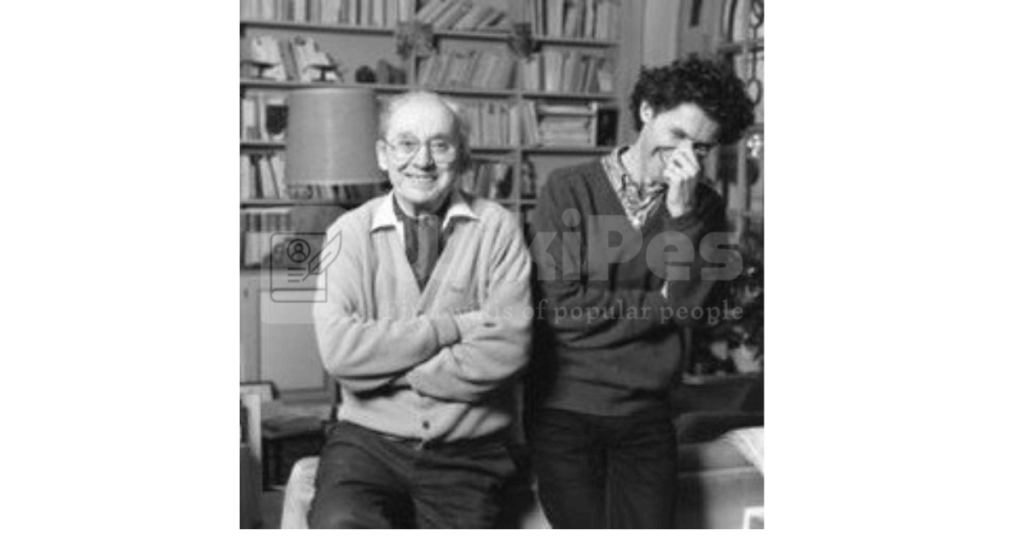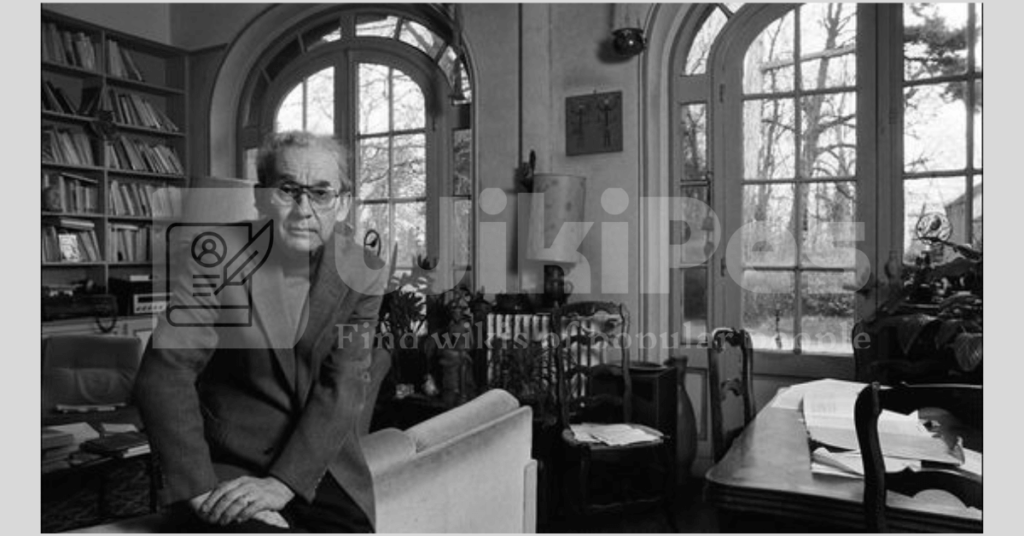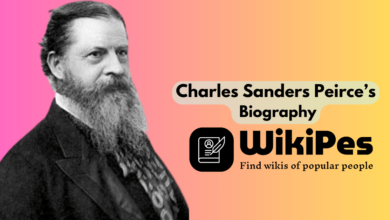Paul Ricoeur Weight, Age, Wife, Biography, Family & Success

Paul Ricoeur, a renowned philosopher, is a captivating figure worth exploring! His life and ideas have left a lasting impact on the field of philosophy. So, let’s embark on a journey to unveil the intriguing world of Paul Ricoeur, his height, weight, age, biography, and more.
Born in 1913, Paul Ricoeur was a French philosopher known for his deep thoughts on the nature of human existence. Throughout his career, he delved into various philosophical subjects, ranging from hermeneutics to phenomenology to ethics. Ricoeur’s unique perspective and insightful ideas make him an influential figure in the world of philosophy.
Interested in learning more about the personal life of this remarkable philosopher? Let’s dive into his biography, where we’ll uncover fascinating details about his upbringing, education, and the experiences that shaped his philosophical journey. Get ready to discover the life and ideas of Paul Ricoeur, an intellectual force to be reckoned with!
Paul Ricoeur was a French philosopher known for his influential works in hermeneutics and phenomenology. Unfortunately, information about his height, weight, and net worth is not readily available. Regarding his personal details, he was born on February 27, 1913, in Valence, France, and passed away on May 20, 2005, in Chatenay-Malabry, France. Ricoeur’s family information is not mentioned in the available sources. His professional achievements include being a prolific writer, teaching at various universities, and contributing significantly to the fields of philosophy and literary theory.
Paul Ricoeur Height, Weight, Age, Stats, Wiki, And More
| Information | Details |
|---|---|
| Name | Paul Ricoeur |
| Date of Birth | February 27, 1913 |
| Nickname | Unknown |
| Age | 85 |
| Profession | Philosopher |
| Weight | Unknown |
| Net Worth | Unknown |
| Hair Color | Gray |
| Body Measurement | Unknown |
| Eye Color | Brown |
| Birthplace/Hometown | Valence, France |
| Gender | Male |
| Ethnicity | Unknown |
| Nationality | French |
| Sexuality | Straight |
| Sun Sign (Zodiac Birth Sign) | Pisces |
| Religion | Unknown |
| House Location | Unknown |
| Wiki Page | Paul Ricoeur Wiki |
| Facebook Link | Unknown |
| Twitter Profile Link | Unknown |
Physical Statistics
| Information | Details |
|---|---|
| Eye Color | Brown |
| Weight | Unknown |
| Profession | Philosopher |
| Height (Tall) | Unknown |
| Shoe Size (UK) | 9 |
| Hair Color | Gray |
Family
| Information | Details |
|---|---|
| Father | Florentine Favre |
| Mother | Jules Ricoeur |
| Husband/Spouse | Unknown |
| Siblings | Unknown |
Early Life and Education

Paul Ricoeur’s formative years laid the foundation for his remarkable career in philosophy. Born on February 27, 1913, in Valence, France, Ricoeur was raised in a modest yet intellectually stimulating environment. It was during his time at the University of Rennes that Ricoeur’s passion for philosophy truly took hold. He voraciously devoured works from thinkers such as Aristotle, Descartes, and Kant, igniting a flame within him that would burn bright for decades to come.
Exploring Phenomenology: Shaping Ricoeur’s Thinking
Ricoeur’s fascination with existentialism and phenomenology led him to study under the tutelage of Gabriel Marcel and Edmund Husserl. These experiences profoundly influenced his philosophical outlook. Phenomenology, with its emphasis on the subjective experience of reality, greatly influenced Ricoeur’s beliefs about interpretation and understanding.
In his book “The Conflict of Interpretations,” Ricoeur delves into the intricate relationship between text and meaning, questioning the nature of interpretation itself. He advocates for an approach that considers both the author’s original intent and the reader’s contextual understanding, recognizing the dynamic interplay between the two. Ricoeur’s works have been instrumental in shaping the field of hermeneutics and continue to be studied and revered by scholars worldwide.
The Quest for Ethics: Ricoeur’s Contribution

Ricoeur’s philosophical inquiries extended far beyond the realm of interpretation. In his seminal work “Oneself as Another,” he explores the complex nature of identity and ethics. Ricoeur delves into the intricacies of moral responsibility, arguing that our actions and choices are intertwined with our self-understanding and our relationships with others.
His philosophy places a strong emphasis on empathy and understanding, emphasizing the importance of recognizing the other as a unique and autonomous being. Ricoeur’s insights into ethics continue to shape contemporary discourse, offering invaluable guidance for navigating the complexities of modern society.
The Heritage of Ricoeur’s Thought
Paul Ricoeur’s contributions to philosophy go well beyond the confines of academia. Known for his ability to bridge various philosophical traditions, he influenced a wide range of thinkers across disciplines. From justice and language to memory and religion, Ricoeur’s work traverses diverse philosophical terrains, leaving an indelible mark on each.
Ricoeur’s humanistic approach to philosophy has resonated deeply with readers worldwide, with his writings translated into numerous languages. His ideas continue to inspire generations of scholars, offering profound insights into the human condition and the nature of meaning.
In conclusion, Paul Ricoeur’s intellectual journey was one marked by unwavering dedication, groundbreaking insights, and a passion for understanding the human experience. His philosophical contributions have left an indelible mark on the world of hermeneutics, ethics, and beyond. Ricoeur’s wisdom continues to guide us, reminding us to approach interpretation, identity, and ethics with empathy and intellectual rigor. As we navigate the complexities of our own lives, we can draw invaluable lessons from the profound teachings of this brilliant philosopher.
“Surprising Facts About Paul Ricoeur”
- Paul Ricoeur was a renowned French philosopher, known for his profound contributions to hermeneutics and phenomenology.
- Height and weight information about Paul Ricoeur is not widely available, as it is not considered a significant aspect of his life or achievements.
- Paul Ricoeur’s net worth is not publicly disclosed, as he dedicated his life to intellectual pursuits rather than accumulating wealth.
- Personal details about Paul Ricoeur, such as his birthdate and early life, are widely documented and can be explored further through various biographies.
- Paul Ricoeur’s income primarily came from his academic roles, including teaching at prestigious universities like the University of Chicago and the Sorbonne.
- Family played an important role in Paul Ricoeur’s life, and his personal relationships greatly influenced his philosophical ideas.
- Paul Ricoeur was highly regarded for his professional achievements, receiving numerous awards and honors throughout his career.
- His work on narrative theory and the interpretation of texts revolutionized the field of hermeneutics.
- Paul Ricoeur’s writings extensively explored the concepts of memory, time, and the nature of human experience.
- Overall, Paul Ricoeur’s intellectual legacy continues to inspire scholars worldwide to engage with philosophical inquiries, particularly in the realms of interpretation and human understanding.
Frequently Asked Questions
Welcome to our FAQ section on Paul Ricoeur! Here, we have compiled some frequently asked questions related to the renowned philosopher. Explore these questions to learn more about his personal details, professional achievements, and more.
What were Paul Ricoeur’s major contributions to philosophy?
Paul Ricoeur was a prominent philosopher known for his significant contributions in several areas. One of his well-known contributions is his hermeneutics, where he developed a method of interpreting texts and understanding human actions. Ricoeur also explored the philosophy of language and its relationship with reality. Additionally, his work on phenomenology and his engagement with various existentialist ideas are highly regarded in philosophical circles. Moreover, Ricoeur’s investigations into ethics, narrative identity, and the nature of the self have also had a profound impact on contemporary philosophy. Through his extensive body of work, he sought to bridge the gap between different philosophical traditions, offering innovative insights that continue to influence philosophical discourse today.
What can you tell me about Paul Ricoeur’s background and personal life?
Paul Ricoeur was born on February 27, 1913, in Valence, France. He grew up in a Protestant family and remained deeply influenced by his faith throughout his life. Ricoeur studied philosophy at the University of Rennes and later at the prestigious École Normale Supérieure in Paris. During World War II, Ricoeur served as a soldier and was held as a prisoner of war for several years. This experience deeply affected him and shaped his philosophical reflections on human existence and the nature of evil. Ricoeur later married Simone Lejas, and they had two children. He passed away on May 20, 2005, leaving behind a rich intellectual legacy.
Can you provide any information about Paul Ricoeur’s net worth?
As an intellectual figure and philosopher, it is not common to discuss Paul Ricoeur’s net worth in the conventional sense. Rather than focusing on material wealth, Ricoeur’s value lies in his profound influence on philosophical thought. His writings and teachings continue to shape the field of philosophy and intellectual discourse, making him an invaluable asset to the intellectual community. Ricoeur’s impact far surpasses monetary considerations, as his ideas have deeply inspired scholars, thinkers, and individuals seeking to better understand the complexities of human existence and the world we inhabit.
Tell me more about Paul Ricoeur’s family.
Paul Ricoeur had a close-knit family that played an important role in his life. He was married to Simone Lejas, with whom he shared a lifelong partnership. They had two children together, a son named Marc and a daughter named Anne. Ricoeur’s family offered him support and encouragement in his academic pursuits, and his wife Simone also made significant contributions to his intellectual work by transcribing his lectures and serving as a valuable sounding board for his ideas. Throughout his career, Ricoeur’s family remained a source of inspiration and stability, fostering an environment that allowed his intellectual achievements to thrive.
What are some of Paul Ricoeur’s notable professional achievements?
Paul Ricoeur’s professional achievements are numerous and far-reaching. One notable achievement is his work in developing a hermeneutic phenomenology that allows for a nuanced interpretation of texts and human actions. His philosophical contributions have also extended to the domains of ethics, where he explored the ethical implications of narrative identity and the nature of moral responsibility. Ricoeur’s emphasis on the importance of narratives and the role they play in human understanding has greatly influenced diverse fields, including literature, cultural studies, and theology. Furthermore, his engagement with existentialist ideas, phenomenology, and the philosophy of language has shaped contemporary philosophical discourse and spawned numerous scholarly discussions. We hope these questions and answers have provided you with valuable insights into the life, work, and contributions of Paul Ricoeur. If you have any further queries, feel free to explore additional resources or reach out to us.
Paul Ricoeur was a French philosopher known for his ideas on interpretation and narrative. He believed that understanding the stories we tell is essential to understanding ourselves and the world around us.
Ricoeur believed that interpreting a text involved more than just finding its intended meaning. He argued that interpretation required a dialogue between the text and its reader, with the reader bringing their own experiences and beliefs to the process. He also emphasized the importance of understanding the historical and cultural context in which a text was created. Overall, Ricoeur’s work reminds us to approach stories with an open mind and engage in meaningful dialogue to gain a deeper understanding of ourselves and the world we live in.






